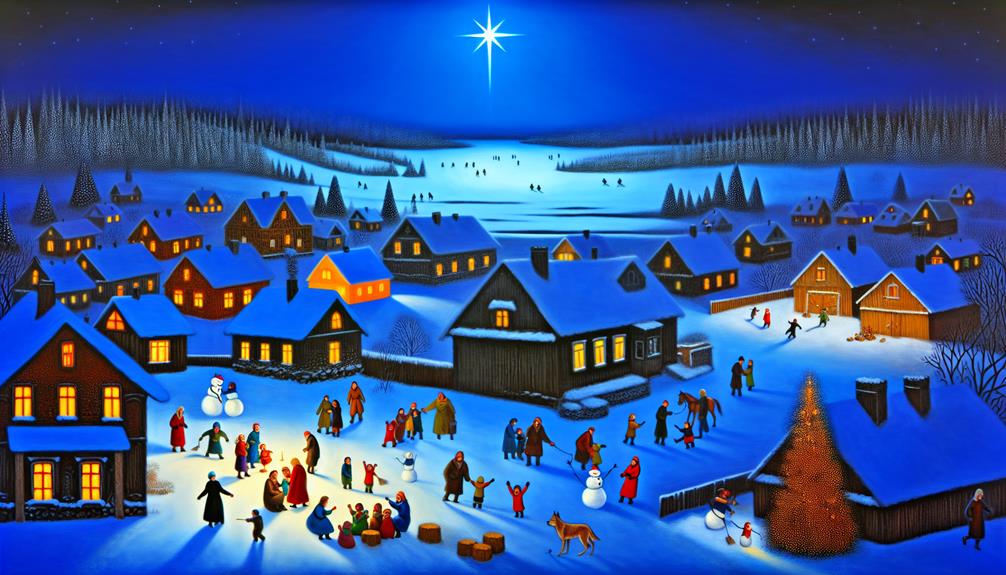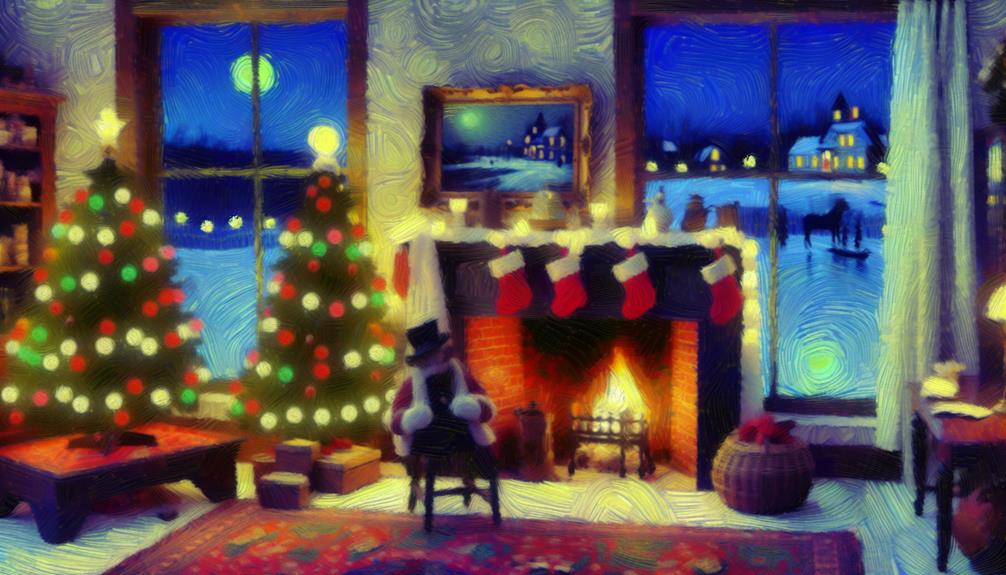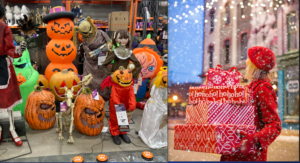Christmas feels so nostalgic because it brings back cherished memories of childhood, festive traditions, and the sensory magic of the holidays. The twinkling lights, familiar carols, and delicious scents transport us to simpler, joyful times spent with family. These traditions root us in our past, providing comfort and continuity. Engaging in these customs boosts our mood and strengthens social bonds, offering a sense of belonging and connection. Even the simplest decorations, like classic ornaments, carry stories and emotions from years gone by. To uncover the full depth behind this festive nostalgia, there’s much more to explore.
Takeaways
- Christmas traditions evoke childhood memories and emotional bonds through familiar rituals, sights, sounds, and scents.
- Holiday activities like decorating and baking reconnect individuals to past celebrations, fostering a sense of continuity.
- Media portrayals and societal influences amplify nostalgic feelings through music, films, and advertisements.
- Sharing stories and memories during Christmas gatherings strengthens family ties and emotional connections.
Definition of Christmas Nostalgia
Christmas nostalgia refers to the sentimental longing for past Christmas celebrations, often evoking warm memories of childhood and family traditions. This nostalgic Christmas feeling is sparked by the sights, sounds, and scents that make the holiday season special. Think about the twinkling lights, the joyous carols, and the mouthwatering aroma of baking cookies. These sensory experiences create a vivid emotional experience that transports us back to simpler times.
Holiday traditions play a significant role in this emotional journey. Whether it’s decorating a Christmas tree with vintage ornaments, singing carols around the fireplace, or baking grandma’s famous gingerbread cookies, these activities strengthen our connection to the past. They provide a sense of continuity and belonging, making us feel part of something enduring and meaningful.
The emotional experience of Christmas nostalgia is often tied to the idealization of past celebrations. We remember the joy, warmth, and connection with loved ones, viewing these memories through a positive lens. This idealization contributes to an overarching sense of happiness and comfort, making the holiday season feel magical.
Essentially, the nostalgic Christmas elements enhance the festive atmosphere, allowing us to relive cherished moments and create new ones with those we love.
Benefits of Holiday Nostalgia

Holiday nostalgia offers numerous benefits, starting with a notable boost in mood and self-esteem, which can greatly improve our overall well-being.
Furthermore, engaging in nostalgic activities encourages social connections, providing an opportunity to share cherished memories and experiences with loved ones.
Reflecting on these joyful times not only brings people closer but also creates a warm and inclusive atmosphere, fostering a sense of togetherness during the festive season.
Boosts Mood and Self-Esteem
Engaging with nostalgic traditions during the Christmas season can greatly enhance mood and self-esteem by evoking positive memories of childhood and family gatherings. Nostalgia, a sentimental longing for the past, is particularly potent during the holiday season. This emotional connection to earlier times can lift spirits and reinforce a sense of self-worth.
Reflecting on joyful past experiences brings a comforting sense of continuity, helping people feel grounded and optimistic. Such reflections might include the warmth of family meals, the excitement of opening gifts, or the simple joy of holiday decorations. These memories can act as a beacon of light, especially during challenging times, reminding individuals of the happiness they once felt and can feel again.
Below is a table illustrating how nostalgia affects mood and self-esteem during the holiday season:
| Aspect | Effect of Nostalgia | Holiday Example |
|---|---|---|
| Mood | Enhances and uplifts | Remembering past Christmas mornings |
| Self-Esteem | Reinforces a positive self-image | Recalling moments of familial love and support |
| Emotional Well-Being | Fosters a sense of connection to the past | Singing traditional carols with loved ones |
| Optimism | Inspires hope for the future | Planning new traditions based on old ones |
Encourages Social Connection
Building on the positive impact of nostalgia on mood and self-esteem, it also plays a pivotal role in encouraging social connection during the Christmas season. Nostalgia, especially around the holidays, invites us to share stories and memories with family and friends. This sharing fosters deeper emotional bonds, making us feel closer to those we care about.
As we gather around the dinner table or sit by the fire, recounting cherished moments from past Christmases, we create a sense of belonging and connectedness.
Engaging in nostalgic holiday traditions can be a comforting routine that brings families together. Whether it’s baking cookies, decorating the tree, or singing carols, these activities can reduce anxiety and depression, providing a sense of stability and joy. Reflecting on positive childhood memories during the Christmas season not only enhances our mood but also boosts our self-esteem, making us feel more optimistic.
Nostalgia serves as a powerful coping mechanism, transforming past events into positive recollections. This collective experience of reminiscing about shared holiday moments strengthens social ties within families and communities. By wrapping ourselves in the warm glow of Christmas nostalgia, we build stronger, more meaningful connections with those around us.
Role in Traditions
Christmas traditions serve as vital connections to the past, offering a sense of stability and continuity that reinforces nostalgic feelings during the holiday season. These rituals, whether they’re decorating the tree or baking favorite holiday treats, act like time machines that transport us back to cherished memories and familiar moments.
Engaging in these beloved traditions is like wrapping ourselves in a warm blanket of nostalgia. Here’s why they’re so effective:
- Memory Triggers: The sights, sounds, and smells of Christmas—like twinkling lights, carols, and pine scents—help us vividly recall childhood experiences.
- Emotional Bonds: Participating in these rituals strengthens our connections with loved ones, as we share and relive these special moments together.
- Comforting Routines: The repetition of traditions provides a comforting routine that helps alleviate anxiety, making the holiday season feel safe and predictable.
- Cultural Continuity: Maintaining these traditions guarantees that cultural and familial values are passed down through generations, fostering a sense of belonging and identity.
Deviating from established Christmas traditions can unsettle this emotional comfort, highlighting just how important these rituals are in cultivating a nostalgic and emotionally fulfilling holiday experience.
Psychological Impact

Understanding the psychological impact of Christmas nostalgia reveals how deeply intertwined our emotions are with holiday traditions. When we reflect back on childhood Christmas memories, it often brings an uplifting wave of happiness and comfort. This nostalgic journey strengthens our mental health by making us feel connected to our past and those we cherish.
Nostalgia plays an essential role in boosting our mood and self-esteem. Engaging in familiar holiday activities, like decorating the tree or listening to classic carols, can ease feelings of anxiety and depression. These traditions create a sense of belonging and continuity, which is particularly soothing amidst the stresses of adulthood.
Music and other holiday cues have a magical way of triggering nostalgic memories. A simple song or the scent of gingerbread can evoke powerful emotional responses, allowing us to relive cherished moments from our past. These emotional experiences enhance social connectedness, making us feel closer to family and friends.
Moreover, nostalgia during Christmas inspires optimism about the future. By drawing lessons from past experiences, we find hope and motivation to face upcoming challenges, reinforcing our mental health and emotional resilience.
Coping Strategies

Coping with Christmas nostalgia can be both heartwarming and challenging. Engaging in nostalgic activities, like decorating with vintage ornaments or baking family recipes, often provides comfort and joy.
Setting realistic expectations and acknowledging feelings of sadness are also essential steps in managing the emotional layers of the season.
Engaging in Nostalgic Activities
Engaging in nostalgic activities during the holiday season can substantially enhance emotional well-being and foster a deeper sense of connection with loved ones. Many people find comfort in revisiting nostalgic traditions that remind them of good times. For instance, sending out Christmas cards that reflect on cherished memories can be a delightful way to spread joy and warmth.
Here are some engaging nostalgic activities that can lift spirits during Christmas:
- Looking through old family photos: This simple act can bring back fond memories and spark conversations about past holidays, creating a sense of continuity and belonging.
- Revisiting childhood traditions: Whether it’s baking your grandmother’s famous cookie recipe or decorating the tree with heirloom ornaments, these rituals can provide comfort and a sense of home.
- Listening to classic Christmas music: Songs and carols have a unique way of evoking powerful memories, often transporting us back to the magical moments of our youth.
- Sharing stories from past Christmases: Engaging in storytelling with family and friends can strengthen bonds and create new memories, helping to alleviate feelings of loneliness or anxiety.
Practicing Realistic Expectations
Managing expectations during the Christmas season is essential to fostering a genuine and fulfilling holiday experience. It’s easy to get caught up in the nostalgic glow of Christmases past, but nostalgia actually works best when paired with realistic expectations. By acknowledging that not every holiday will perfectly match our idealized memories, we can reduce stress and disappointment.
Setting achievable goals for holiday gatherings and traditions helps us stay in the moment. Instead of aiming for perfection, accepting that some memories may evoke mixed emotions allows us to enjoy the present without feeling overwhelmed by longing for the past. This balance of emotions is key to a joyful holiday season.
Open conversations with family and friends about expectations can make gatherings more enjoyable. When everyone is on the same page, it strengthens relationships and makes the experience more fulfilling. Incorporating new traditions alongside cherished ones provides a balance between the nostalgic elements we love and the realities of our current lives. This blend can make the holiday season feel both familiar and fresh.
In the end, practicing realistic expectations allows us to appreciate the magic of Christmas as it is, rather than how we think it should be.
Societal Influence

Societal norms and cultural traditions profoundly shape individual perceptions and emotional responses to Christmas, creating a framework of expectations for the holiday season. The nostalgic feelings many experience during Christmas are deeply rooted in these collective societal influences. Traditions like decorating the tree, exchanging gifts, and singing carols have been passed down through generations, embedding themselves in our memories.
Media portrayals of Christmas further amplify this nostalgia. Classic holiday films, heartwarming music, and festive advertisements often depict an idealized version of the holiday, making us yearn for those perfect moments. This idealization creates a shared cultural memory, reinforcing the nostalgic sentiment.
The societal fabric of Christmas is woven with numerous elements:
- Holiday Rituals: Annual traditions like baking cookies or attending church services.
- Media Influence: Movies, songs, and commercials that shape our holiday expectations.
- Social Interactions: Family gatherings and community events that strengthen emotional ties.
- Cyclical Celebrations: Recurring decorations and music that evoke childhood memories.
These elements collectively contribute to the sense of nostalgia that many feel during the holiday season. They remind us of past celebrations, creating a longing to recreate those cherished moments, enhancing the emotional depth of Christmas.
Nostalgia in Decorations

The nostalgic allure of Christmas is vividly brought to life through decorations that evoke cherished memories and traditions. When we see a Christmas tree adorned with vintage nutcrackers and classic ornaments, it’s like stepping into a time machine, transporting us back to past times filled with joy and wonder. These decorations, often featuring designs from the 60s, 70s, and 80s, are not just objects; they’re treasured keepsakes that hold the power to make us feel warm and sentimental.
Advent calendars with nostalgic themes, for example, have a magical way of rekindling the excitement of holiday anticipation. Each door opened reveals a small surprise, much like it did when we were children, connecting us to simpler times. The scents of traditional Christmas baking and the twinkling fairy lights also amplify this nostalgic experience, creating an atmosphere that feels both magical and familiar.
Emotional connections to these nostalgic decorations foster a sense of belonging and continuity among family and friends. As we gather around the Christmas tree, these cherished ornaments and motifs remind us of the holidays we’ve celebrated together, strengthening the bonds that make this season so special.
Frequently Asked Questions
What Makes Christmas Nostalgic?
Christmas is nostalgic due to familiar cues like music, decorations, and scents that evoke childhood memories. Traditional elements and family rituals enhance emotional connections, fostering warmth and belonging, while collective celebrations deepen nostalgia and strengthen social bonds.
Why Do I Feel Nostalgic During Christmas?
Nostalgia during Christmas arises from familiar sensory cues, such as music and decorations, which evoke childhood memories. The season’s emphasis on family gatherings solidifies emotional bonds, enhancing feelings of belonging and continuity, thereby fostering nostalgic sentiments.
Why Is Christmas Music so Nostalgic?
Christmas music triggers profound nostalgia due to its emotional resonance with personal experiences, themes of love and family, and annual repetition. These elements foster deep connections, evoking memories of past celebrations and enhancing the sentimental atmosphere of the season.
Why Does Christmas Feel so Special?
Christmas feels so special due to the combination of cherished traditions, familiar music, and the act of gift-giving, which foster emotional comfort and social bonding, creating a deeply meaningful and joyous holiday experience.
Conclusion
Christmas nostalgia weaves a magical connection between past and present.
This emotional bond enriches traditions, fostering a sense of continuity and warmth.
The psychological impact is profound, offering comfort and joy, while decorating traditions amplify these feelings.
Coping strategies and societal influences further shape holiday experiences, making the season uniquely special.
Through the lens of nostalgia, Christmas becomes more than just a holiday—it transforms into a cherished fabric of memories and emotions, bridging generations and hearts.













